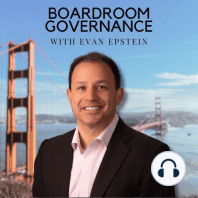64 min listen

Benjamin Means and Douglas Moll: Governance in Closely Held Corporations.
Benjamin Means and Douglas Moll: Governance in Closely Held Corporations.
ratings:
Length:
63 minutes
Released:
Jul 24, 2023
Format:
Podcast episode
Description
0:00 -- Intro.1:38 -- Start of interview.2:31 -- Benjamin Mean's "origin story." He is a Professor of Law and the John T. Campbell Chair in Business and Professional Ethics at the University of South Carolina School of Law.4:14 -- On family businesses, legal education and the Family and Small Business Program at the University of South Carolina School of Law.5:55 -- Douglas Moll's "origin story." He is the Beirne, Maynard & Parsons, L.L.P. Professor of Law at the University of Houston Law Center. 9:41 -- Most corporations in the US are closely held. [There are 33.2 million small businesses in the US, which account for 99.9% of all US businesses (SBA, 2022). The Small Business Administration (SBA) defines a small business as a firm that has fewer than 500 employees.] [Half of all U.S. employees work for small businesses.] Moll: "Think of business organizations on a spectrum: on one end of the spectrum you have public corporations, on the other end you have a wide range of corporations whose stock is not publicly traded."12:37 -- Definition of a "closely held corporation": "It's a surprisingly not easy to answer question." "The easiest way to define a closely held corporation is to say that it is a corporation whose stock is not traded on a public market." It is typically taught to have three elements: 1) no market, 2) having a small number of shareholders, and 3) most shareholders also participate in management.14:36-- On the classic problem of minority shareholder oppression in closely held corporations. Also referred to "freeze-outs" or "squeeze-outs." "A controlling owner typically makes all the decisions, controls the company, and there is no exit because of a lack of a market." (Oppressive behaviors are sometimes referred to as freeze-out or squeeze-out tactics, all synonyms.) "The classic freeze-out/oppression problem is that the majority denies the minority shareholder of both financial rights and participatory rights."20:55 -- How these problems have been solved ex-ante (contractual arrangements).22:58-- On ex-post solutions (as a matter of equity, common law fiduciary duty protection or statutory oppression protection). "In the US, depending how you count them, there are about 40 states that have a statute that allows a minority shareholder to seek the dissolution of a company or some other less drastic relief such as a buyout on the grounds of oppressive conduct by the directors or those in control." "There are another dozen states (and some allow both) that provide relief to minority shareholders via the rubric of fiduciary duties owed by controlling shareholders."26:46 -- On the jurisprudence on oppressive conduct, particularly since the Donahue v Rodd case, 367 Mass. 578 (Mass. 1975) 328 N.E.2d 505.29:19 -- On the influence of F Hodge O'Neal and his treatise on Oppression of Minority Shareholders (first published in 1961).31:29 -- On the "Reasonable Expectation" approach. "It's now the dominant approach when a court is evaluating a shareholder dispute in closely held corporations." What does "oppressive conduct" mean. 35:39 -- On conflict of interest transactions and related-party transactions. "Most states regulate these transactions, they are not per se illegal, but require more scrutiny. They typically require all material information to be fully disclosed and: 1) approved by disinterested directors, or 2) approved by disinterested shareholders; or 3) they must be fair (to be decided by a judge or jury)."39:58 -- On the lack of independent directors in closely held corporations, and hence lack of deference to the business judgment rule.43:51 -- On litigation in closely held corporations: "Most disputes litigated in jurisdictions (outside of Delaware) involve closely held corporations."46:10 -- On Ben and Doug's latest paper: Against Contractual Formalism in Shareholder Oppression Law, U.C. Davis L. Rev. __ (forthcoming 2023).49:30 -- Other important issues to highlight for directors of closely held corpor
Released:
Jul 24, 2023
Format:
Podcast episode
Titles in the series (100)
David Beatty: "Boards Should Invest More Time on Foresight": In this episode, I talk with David Beatty, one of the most experienced Canadian directors and educators about his career and thoughts on governance, including his service on 40 different boards of directors, 9 of them as Chair of public companies. We discuss several governance hot topics, including long-term strategies for boards, dual-class shares, ESG, the job of a director generally, the current state of boards, and more in this fascinating conversation. by Boardroom Governance with Evan Epstein